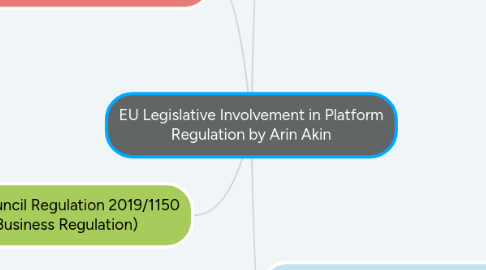EU Legislative Involvement in Platform Regulation by Arin Akin
por Arın Meriç Akın


1. 1. EP and Council Directive 2000/31 (e-Commerce Directive)
1.1. Scope: Art. 1(1) jo. 3(1) Information society services established within the EU
1.2. Aim: Art. 1(1) Removing obstacles to cross-border online services in the Internal Market
1.3. Relevant provisions, e.g. Art. 5-11 Basic requirements for online services, including commercial communications, electronic contracts and information obligations towards consumers
2. 3. EP and Council Regulation 2019/1150 (Platform to Business Regulation)
2.1. Scope: Art. 1(2) Online intermediation services/search engines ("platforms") which are provided to business/corporate website users ("businesses") operating within the EU
2.2. Aim: Art. 1(1) jo. Recital 8 Promoting fairness, transparency and effective redress possibilities
2.3. Relevant provisions, e.g.: Art. 3: Conditions for platforms' terms and conditions for businesses Art. 4: Platforms providing stated reasons for restricted/suspended services, and 30-day grace period for terminated services Art. 5: Transparent ranking of businesses by platforms Art. 7: Transparent differentiated treatment of certain businesses by platforms
3. 4. Commission Proposal on the Digital Services Act package amending the e-Commerce Directive (2020)
3.1. Digital Services Act
3.1.1. Aim: Further egislation regarding illegal content, transparent advertising and disinformation
3.1.2. Scope: (Social media) platforms operating within the EU, although not in force until 2023
3.1.3. Objectives, e.g. disclosure of: - How algorithms work - How decisions to remove content are taken - How advertisers target users
3.2. Digital Markets Act
3.2.1. Aim: Regulating Big Tech firms' behaviour within and beyond the European Single Market
3.2.2. Scope: Big Tech firms operating within the EU, although not in force until 2023
3.2.3. Objectives, e.g.: - Reclassifying larger platforms as "gatekeepers" subject to new obligations - More transparency in mediation - Limiting unfair practices
